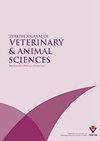Determination of fat preferences of adult dogs
IF 0.6
4区 农林科学
Q4 VETERINARY SCIENCES
引用次数: 3
Abstract
This study was carried out to determine the preferences of dogs for some commonly used fat sources in dog food. Three different types of food were produced using 5% additional sunflower oil, poultry fat, or beef tallow. The food was extruded using a twin-screw extruder at approximately 25% moisture and temperatures in the range of 90 °C to 135 °C. The extrudates were dried for 30–45 min at temperatures of up to 148 °C in a belt dryer. Next, the heated fats were sprayed onto the extrudates. The foods were cooled, sampled, and packaged. A total of 30 neutered adult between 1 and 3 years old male dogs were used. The preference of the dogs for the 3 different fat sources was determined via a 2-pan preference test. Preference tests were conducted for 12 days in pairs, and the dogs consumed each food for 8 days. The dogs had the greatest preference for food containing the additional sunflower oil, with a preference rate of 56%. Beef tallow was the least preferred fat, with a preference rate of 44%. Dogs preferred food containing sunflower oil more than food containing animal fats. It was concluded that dogs showed a preference in proportion to the linoleic acid level in each food.成年犬对脂肪偏好的测定
这项研究是为了确定狗对狗粮中一些常用脂肪来源的偏好。三种不同类型的食物分别添加了5%的葵花籽油、家禽脂肪和牛油。该食品使用双螺杆挤出机在约25%的水分和温度在90°C至135°C范围内挤出。在带式干燥机中,在高达148°C的温度下干燥30-45分钟。接下来,加热后的油脂被喷到挤出物上。这些食物经过冷却、取样和包装。总共使用了30只1至3岁的阉割成年公犬。通过2盘偏好测试确定狗对3种不同脂肪来源的偏好。对狗进行偏好测试,每组12天,每组8天。狗狗最喜欢含有额外葵花籽油的食物,偏好率为56%。牛油是最不受欢迎的脂肪,偏爱率为44%。狗更喜欢含有葵花籽油的食物,而不是含有动物脂肪的食物。结果表明,狗对食物的偏好与食物中亚油酸的含量成正比。
本文章由计算机程序翻译,如有差异,请以英文原文为准。
求助全文
约1分钟内获得全文
求助全文
来源期刊
CiteScore
1.30
自引率
0.00%
发文量
57
审稿时长
24 months
期刊介绍:
The Turkish Journal of Veterinary and Animal Sciences is published electronically 6 times a year by the Scientific and Technological Research Council of Turkey (TÜBİTAK).
Accepts English-language manuscripts on all aspects of veterinary medicine and animal sciences.
Contribution is open to researchers of all nationalities.
Original research articles, review articles, short communications, case reports, and letters to the editor are welcome.
Manuscripts related to economically important large and small farm animals, poultry, equine species, aquatic species, and bees, as well as companion animals such as dogs, cats, and cage birds, are particularly welcome.
Contributions related to laboratory animals are only accepted for publication with the understanding that the subject is crucial for veterinary medicine and animal science.
Manuscripts written on the subjects of basic sciences and clinical sciences related to veterinary medicine, nutrition, and nutritional diseases, as well as the breeding and husbandry of the above-mentioned animals and the hygiene and technology of food of animal origin, have priority for publication in the journal.
A manuscript suggesting that animals have been subjected to adverse, stressful, or harsh conditions or treatment will not be processed for publication unless it has been approved by an institutional animal care committee or the equivalent thereof.
The editor and the peer reviewers reserve the right to reject papers on ethical grounds when, in their opinion, the severity of experimental procedures to which animals are subjected is not justified by the scientific value or originality of the information being sought by the author(s).

 求助内容:
求助内容: 应助结果提醒方式:
应助结果提醒方式:


